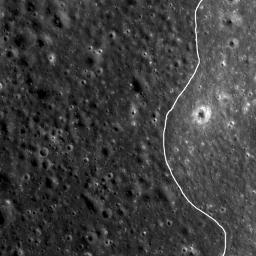
|
Mare Moscoviense Constellation Site
- Click the image above for a larger view
- Full-Res JPEG (1200 x 1200) (205.6 kB)
- Full-Res TIFF (1200 x 1200) (1.4 MB)
Caption:
Original release date January 4, 2010
A very subtle mare-highlands boundary in Mare Moscoviense on the lunar farside, near the center of the Constellation Program region of interest. The generalized geologic contact between the mare and the highlands has been highlighted (mare to the left, highlands to the right). Astronauts exploring this region could collect key samples from the farside basalts of Mare Moscoviense as well as materials from the surrounding basin massifs. Image width is 1.8 km.
Background Info:
NASA's Goddard Space Flight Center built and manages the mission for the Exploration Systems Mission Directorate at NASA Headquarters in Washington. The Lunar Reconnaissance Orbiter Camera was designed to acquire data for landing site certification and to conduct polar illumination studies and global mapping. Operated by Arizona State University, the LROC facility is part of the School of Earth and Space Exploration (SESE). LROC consists of a pair of narrow-angle cameras (NAC) and a single wide-angle camera (WAC). The mission is expected to return over 70 terabytes of image data.
Cataloging Keywords:
| Name | Value | Additional Values |
|---|---|---|
| Target | Moon | |
| System | Earth | |
| Target Type | Satellite | |
| Mission | Lunar Reconnaissance Orbiter (LRO) | |
| Instrument Host | Lunar Reconnaissance Orbiter | |
| Host Type | Orbiter | |
| Instrument | Lunar Reconnaissance Orbiter Camera (NAC) | |
| Detector | Narrow Angle Camera (NAC), Wide Angle Camera (WAC) | |
| Extra Keywords | Grayscale | |
| Acquisition Date | ||
| Release Date | 2010-03-13 | |
| Date in Caption | 2010-01-04 | |
| Image Credit | NASA/GSFC/Arizona State University | |
| Source | photojournal.jpl.nasa.gov/catalog/PIA12939 | |
| Identifier | PIA12939 | |
